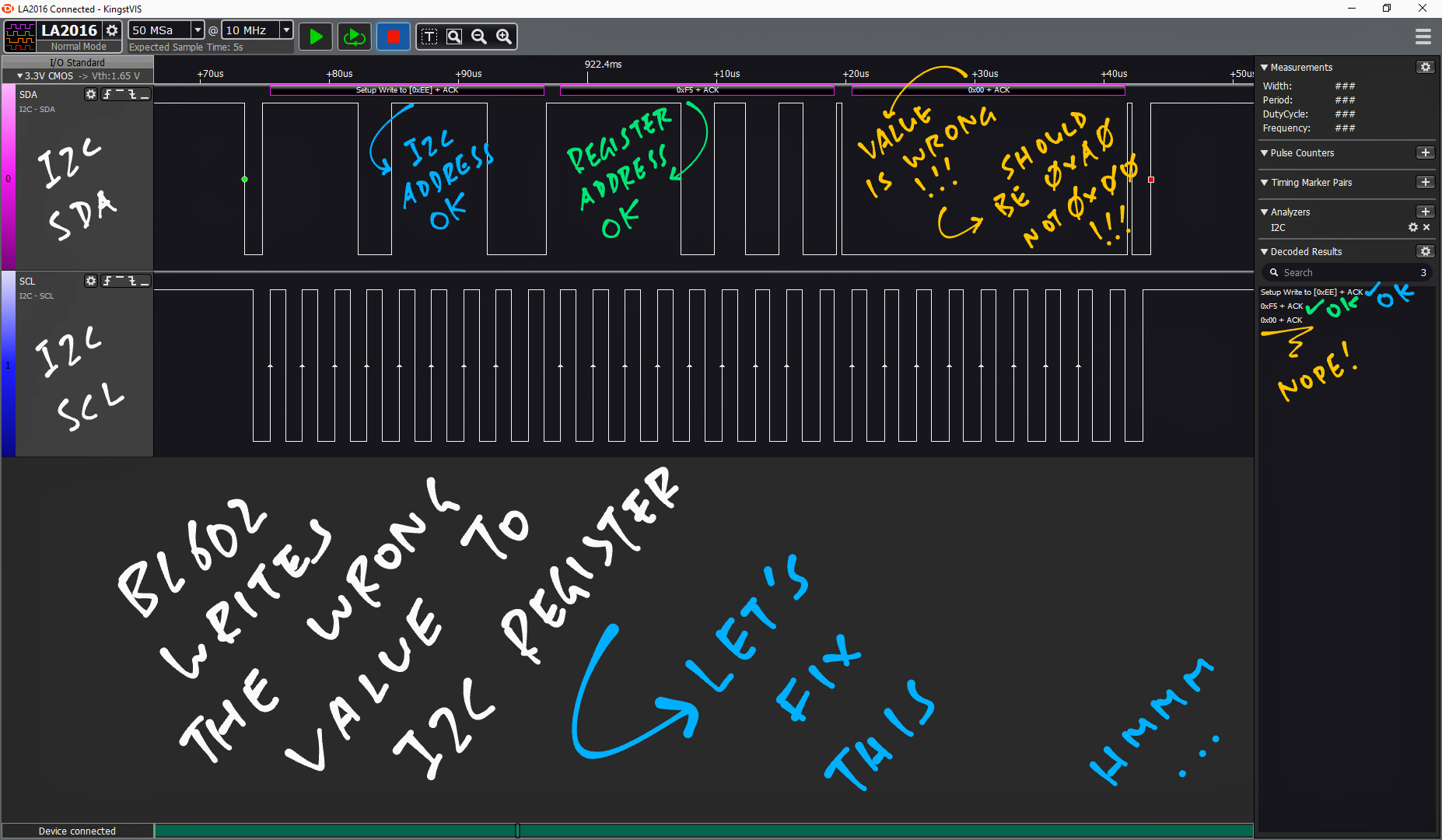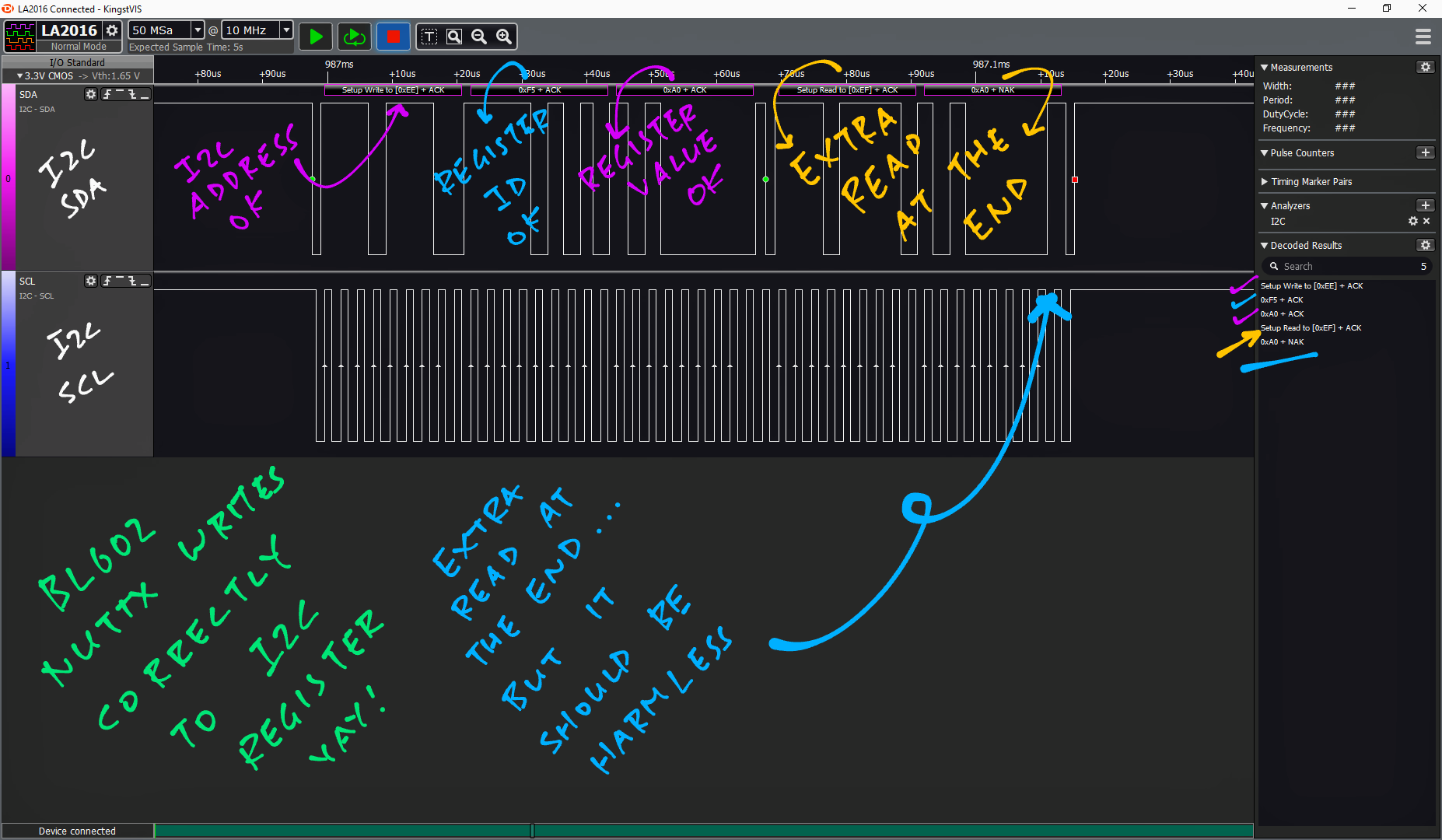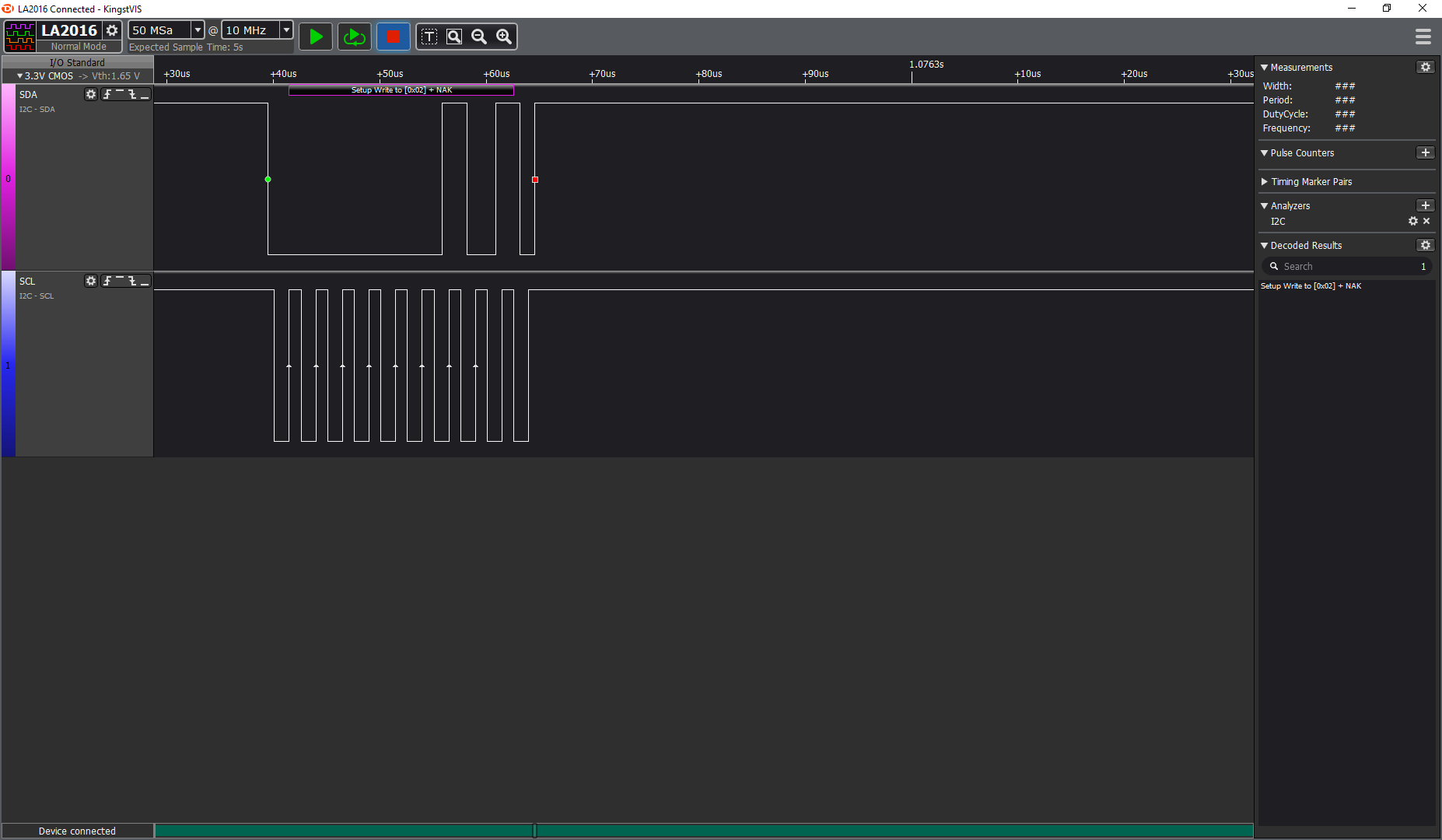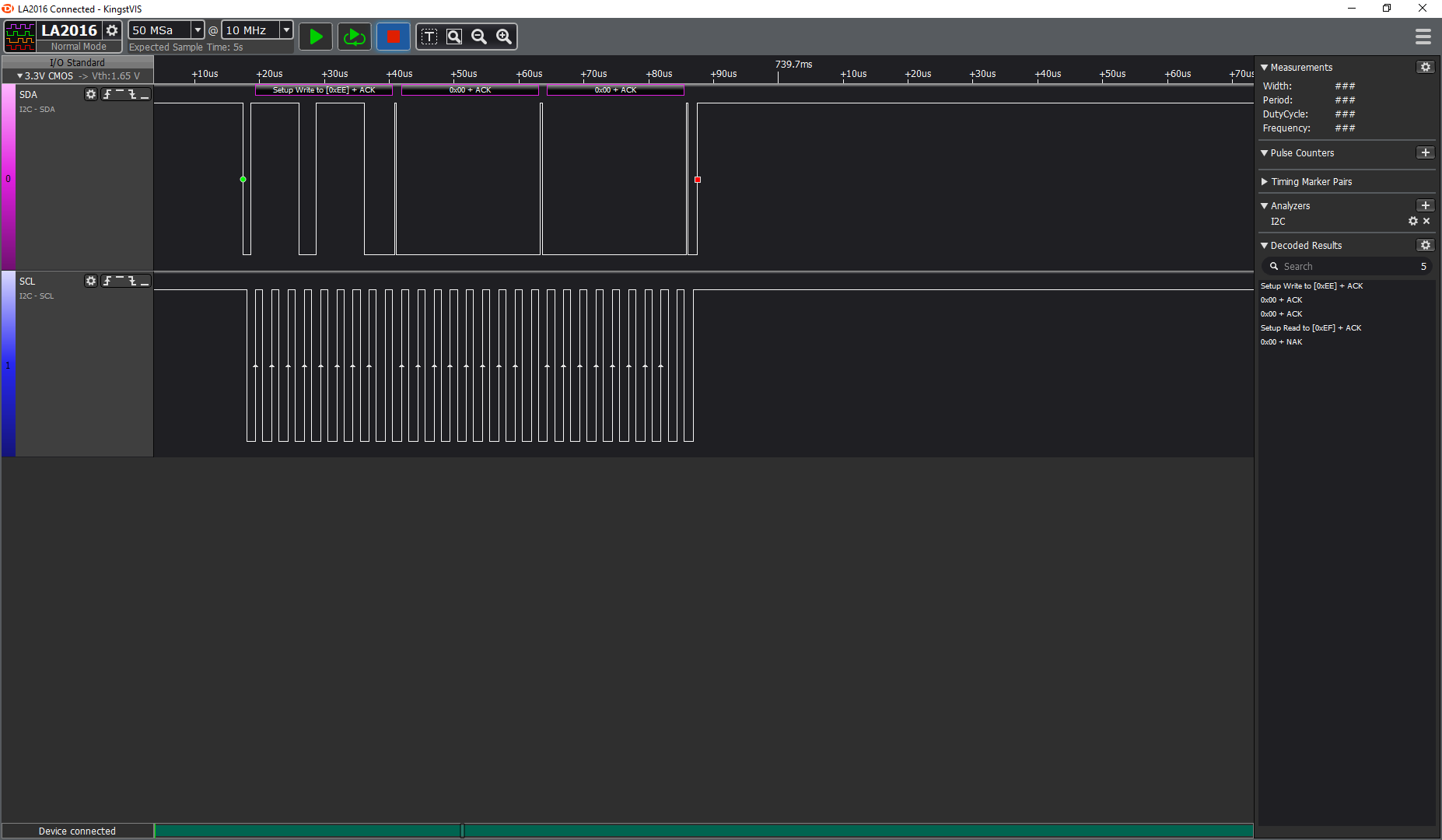(Tested on Pine64 PineCone BL602)
Read the articles...
This repo depends on...
To add this repo to your NuttX project...
## TODO: Change this to the path of our "incubator-nuttx-apps" folder
pushd nuttx/apps/examples
git submodule add https://github.com/lupyuen/rust-i2c-nuttx rust_i2c
popdThen update the NuttX Build Config...
## TODO: Change this to the path of our "incubator-nuttx" folder
cd nuttx/nuttx
## Preserve the Build Config
cp .config ../config
## Erase the Build Config
make distclean
## For BL602: Configure the build for BL602
./tools/configure.sh bl602evb:nsh
## For ESP32: Configure the build for ESP32.
## TODO: Change "esp32-devkitc" to our ESP32 board.
./tools/configure.sh esp32-devkitc:nsh
## Restore the Build Config
cp ../config .config
## Edit the Build Config
make menuconfig In menuconfig, enable the Rust I2C App under "Application Configuration" → "Examples".
To build the NuttX + Rust project...
cd nuttx/apps/examples/rust_i2c
./run.shIn NuttX Shell, enter this to run the app...
rust_i2cHere's the output...
NuttShell (NSH) NuttX-10.2.0-RC0
nsh> rust_i2c
Hello from Rust!
test_i2c
test_i2c: Register 0xd0 is 0x60
test_hal_read
test_hal_read: Register 0xd0 is 0x60
test_hal_write
test_hal_write: Write 0xA0 to register
test_hal_write: Register value is 0xa0
test_hal_write: Write 0x00 to register
test_hal_write: Register value is 0x00
read_bme280
Relative Humidity = 89.284164%
Temperature = 29.942907 deg C
Pressure = 100483.04 pascals
Done!
nsh>
The Rust Embedded HAL for NuttX has been published at crates.io...
https://crates.io/crates/nuttx-embedded-hal
To use it in your project, add this to your Cargo.toml:
# External Rust libraries used by this module. See crates.io.
[dependencies]
nuttx-embedded-hal = "1.0.6" # Rust Embedded HAL for NuttX: https://crates.io/crates/nuttx-embedded-hal
(Always use the latest version of nuttx-embedded-hal)
This is how we read an I2C Register in C...
static int bme280_reg_read(const struct device *priv,
uint8_t start, uint8_t *buf, int size)
{
DEBUGASSERT(priv != NULL);
DEBUGASSERT(buf != NULL);
struct i2c_msg_s msg[2];
int ret;
msg[0].frequency = priv->freq;
msg[0].addr = priv->addr;
#ifdef CONFIG_BL602_I2C0
// For BL602: Register ID must be passed as I2C Sub Address
msg[0].flags = I2C_M_NOSTOP;
#else
// Otherwise pass Register ID as I2C Data
msg[0].flags = 0;
#endif // CONFIG_BL602_I2C0
msg[0].buffer = &start;
msg[0].length = 1;
msg[1].frequency = priv->freq;
msg[1].addr = priv->addr;
msg[1].flags = I2C_M_READ;
msg[1].buffer = buf;
msg[1].length = size;
ret = I2C_TRANSFER(priv->i2c, msg, 2);How do we call I2C_TRANSFER from a NuttX App? Thanks to the I2C Demo App we have the answer...
int i2ctool_get(FAR struct i2ctool_s *i2ctool, int fd, uint8_t regaddr,
FAR uint16_t *result)
{
struct i2c_msg_s msg[2];
...
int ret = i2cdev_transfer(fd, msg, 2);i2cdev_transfer is defined as...
int i2cdev_transfer(int fd, FAR struct i2c_msg_s *msgv, int msgc)
{
struct i2c_transfer_s xfer;
/* Set up the IOCTL argument */
xfer.msgv = msgv;
xfer.msgc = msgc;
/* Perform the IOCTL */
return ioctl(fd, I2CIOC_TRANSFER, (unsigned long)((uintptr_t)&xfer));
}Let's port this to Rust.
Earlier we've seen i2c_msg_s and i2c_transfer_s. They are defined as...
struct i2c_msg_s
{
uint32_t frequency; /* I2C frequency */
uint16_t addr; /* Slave address (7- or 10-bit) */
uint16_t flags; /* See I2C_M_* definitions */
FAR uint8_t *buffer; /* Buffer to be transferred */
ssize_t length; /* Length of the buffer in bytes */
};struct i2c_transfer_s
{
FAR struct i2c_msg_s *msgv; /* Array of I2C messages for the transfer */
size_t msgc; /* Number of messages in the array. */
};I2CIOC_TRANSFER is defined as...
#define I2CIOC_TRANSFER _I2CIOC(0x0001)_I2CIOC is defined as...
#define _I2CIOC(nr) _IOC(_I2CBASE,nr)_IOC and _I2CBASE are defined as...
#define _IOC(type,nr) ((type)|(nr))#define _I2CBASE (0x2100) /* I2C driver commands */We'll port these C Types and Constants to Rust as well.
Here's how we read an I2C Register in Rust, ported from the above C code...
/// Test the I2C Port by reading an I2C Register
pub fn test_i2c() {
println!("test_i2c");
// Open I2C Port
let i2c = unsafe {
open(b"/dev/i2c0\0".as_ptr(), O_RDWR)
};
assert!(i2c > 0);
// Read one I2C Register, starting at Device ID
let mut start = [BME280_REG_ID ; 1];
let mut buf = [0u8 ; 1];
// Compose I2C Transfer
let msg: [i2c_msg_s ; 2] = [
// First I2C Message: Send Register ID
i2c_msg_s {
frequency: BME280_FREQ, // I2C Frequency
addr: BME280_ADDR, // I2C Address
buffer: start.as_mut_ptr(), // Buffer to be sent
length: start.len() as ssize_t, // Length of the buffer in bytes
// For BL602: Register ID must be passed as I2C Sub Address
#[cfg(target_arch = "riscv32")] // If architecture is RISC-V 32-bit...
flags: I2C_M_NOSTOP, // I2C Flags: Send I2C Sub Address
// Otherwise pass Register ID as I2C Data
#[cfg(not(target_arch = "riscv32"))] // If architecture is not RISC-V 32-bit...
flags: 0, // I2C Flags: None
// TODO: Check for BL602 specifically, not just RISC-V 32-bit
},
// Second I2C Message: Receive Register Value
i2c_msg_s {
frequency: BME280_FREQ, // I2C Frequency
addr: BME280_ADDR, // I2C Address
buffer: buf.as_mut_ptr(), // Buffer to be received
length: buf.len() as ssize_t, // Length of the buffer in bytes
flags: I2C_M_READ, // I2C Flags: Read from I2C Device
},
];
// Compose ioctl Argument
let xfer = i2c_transfer_s {
msgv: msg.as_ptr(), // Array of I2C messages for the transfer
msgc: msg.len() as size_t, // Number of messages in the array
};
// Execute I2C Transfer
let ret = unsafe {
ioctl(
i2c,
I2CIOC_TRANSFER,
&xfer
)
};
assert!(ret >= 0);
// Show the received Register Value
println!(
"test_i2c: Register 0x{:02x} is 0x{:02x}",
BME280_REG_ID, // Register ID (0xD0)
buf[0] // Register Value (0x60)
);
// Register Value must be BME280 Device ID (0x60)
assert!(buf[0] == BME280_CHIP_ID);
// Close the I2C Port
unsafe { close(i2c); }
// Sleep 5 seconds
unsafe { sleep(5); }
}The NuttX Types are ported from C to Rust like so...
/// I2C Message Struct: I2C transaction segment beginning with a START. A number of these can
/// be transferred together to form an arbitrary sequence of write/read
/// transfer to an I2C device.
/// TODO: Import with bindgen from https://github.com/lupyuen/incubator-nuttx/blob/rusti2c/include/nuttx/i2c/i2c_master.h#L208-L215
#[repr(C)]
pub struct i2c_msg_s {
/// I2C Frequency
pub frequency: u32,
/// I2C Address
pub addr: u16,
/// I2C Flags (I2C_M_*)
pub flags: u16,
/// Buffer to be transferred
pub buffer: *mut u8,
/// Length of the buffer in bytes
pub length: ssize_t,
}
/// I2C Transfer Struct: This structure is used to communicate with the I2C character driver in
/// order to perform IOCTL transfers.
/// TODO: Import with bindgen from https://github.com/lupyuen/incubator-nuttx/blob/rusti2c/include/nuttx/i2c/i2c_master.h#L231-L235
#[repr(C)]
pub struct i2c_transfer_s {
/// Array of I2C messages for the transfer
pub msgv: *const i2c_msg_s,
/// Number of messages in the array
pub msgc: size_t,
}To build the NuttX + Rust project...
cd nuttx/apps/examples/rust_i2c
./run.shIn NuttX Shell, enter this to run our Rust app...
rust_i2cOur Rust app reads BME280 Register 0xD0 (Device ID), which should contain 0x60...
NuttShell (NSH) NuttX-10.2.0-RC0
nsh> rust_i2c
Hello from Rust!
test_i2c
i2cdrvr_ioctl: cmd=2101 arg=4201c378
bl602_i2c_transfer: subflag=1, subaddr=0xd0, sublen=1
bl602_i2c_recvdata: count=1, temp=0x60
bl602_i2c_transfer: i2c transfer success
test_i2c: Register 0xd0 is 0x60
Done!
nsh>
Yep our Rust app reads the BME280 I2C Register correctly!
Rust Embedded HAL defines a standard API for I2C Operations. Let's wrap the NuttX I2C ioctl() Commands and expose as Rust Embedded HAL interfaces...
/// NuttX Implementation of I2C Read
impl i2c::Read for I2c {
...
/// TODO: Read I2C data
fn read(&mut self, addr: u8, buf: &mut [u8]) -> Result<(), Self::Error> { ... }
}
/// NuttX Implementation of I2C Write
impl i2c::Write for I2c {
...
/// TODO: Write I2C data
fn write(&mut self, addr: u8, buf: &[u8]) -> Result<(), Self::Error> { ... }
}
/// NuttX Implementation of I2C WriteRead
impl i2c::WriteRead for I2c {
...
/// TODO: Write and read I2C data
fn write_read(&mut self, addr: u8, wbuf: &[u8], rbuf: &mut [u8]) -> Result<(), Self::Error> { ... }
}Here's how we implement the Rust Embedded HAL to read an I2C Register...
/// NuttX Implementation of I2C WriteRead
impl i2c::WriteRead for I2c {
/// Error Type
type Error = i32;
/// Write `wbuf` to I2C Port and read `rbuf` from I2C Port.
/// We assume this is a Read I2C Register operation, with Register ID at `wbuf[0]`.
/// TODO: Handle other kinds of I2C operations
fn write_read(&mut self, addr: u8, wbuf: &[u8], rbuf: &mut [u8]) -> Result<(), Self::Error> {
// We assume this is a Read I2C Register operation, with Register ID at wbuf[0]
assert_eq!(wbuf.len(), 1);
let reg_id = wbuf[0];
// Read I2C Registers, starting at Register ID
let mut start = [reg_id ; 1];
// Compose I2C Transfer
let msg = [
// First I2C Message: Send Register ID
i2c_msg_s {
frequency: self.frequency, // I2C Frequency
addr: addr as u16, // I2C Address
buffer: start.as_mut_ptr(), // Buffer to be sent
length: start.len() as ssize_t, // Number of bytes to send
// For BL602: Register ID must be passed as I2C Sub Address
#[cfg(target_arch = "riscv32")] // If architecture is RISC-V 32-bit...
flags: crate::I2C_M_NOSTOP, // I2C Flags: Send I2C Sub Address
// Otherwise pass Register ID as I2C Data
#[cfg(not(target_arch = "riscv32"))] // If architecture is not RISC-V 32-bit...
flags: 0, // I2C Flags: None
// TODO: Check for BL602 specifically (by target_abi?), not just RISC-V 32-bit
},
// Second I2C Message: Receive Register Values
i2c_msg_s {
frequency: self.frequency, // I2C Frequency
addr: addr as u16, // I2C Address
buffer: rbuf.as_mut_ptr(), // Buffer to be received
length: rbuf.len() as ssize_t, // Number of bytes to receive
flags: I2C_M_READ, // I2C Flags: Read I2C Data
},
];
// Compose ioctl Argument
let xfer = i2c_transfer_s {
msgv: msg.as_ptr(), // Array of I2C messages for the transfer
msgc: msg.len() as size_t, // Number of messages in the array
};
// Execute I2C Transfer
let ret = unsafe {
ioctl(
self.fd,
I2CIOC_TRANSFER,
&xfer
)
};
assert!(ret >= 0);
Ok(())
}
}To read an I2C Register, we call the Rust Embedded HAL like so...
/// Test the I2C HAL by reading an I2C Register
pub fn test_hal_read() {
// Open I2C Port
let mut i2c = nuttx_embedded_hal::I2c::new(
"/dev/i2c0", // I2C Port
BME280_FREQ, // I2C Frequency
).expect("open failed");
// Buffer for received I2C data
let mut buf = [0 ; 1];
// Read one I2C Register, starting at Device ID
i2c.write_read(
BME280_ADDR as u8, // I2C Address
&[BME280_REG_ID], // Register ID (0x60)
&mut buf // Buffer to be received
).expect("read register failed");
// Show the received Register Value
println!(
"test_hal_read: Register 0x{:02x} is 0x{:02x}",
BME280_REG_ID, // Register ID (0xD0)
buf[0] // Register Value (0x60)
);
// Register Value must be BME280 Device ID (0x60)
assert_eq!(buf[0], BME280_CHIP_ID);
}Rust Embedded HAL works OK for reading an I2C Register!
NuttShell NSH NuttX-10.2.0-RC0
nsh> rust_i2c
Hello from Rust!
...
test_hal_read
i2cdrvr_ioctl: cmd=2101 arg=4201c360
bl602_i2c_transfer: subflag=1, subaddr=0xd0, sublen=1
bl602_i2c_recvdata: count=1, temp=0x60
bl602_i2c_transfer: i2c transfer success
test_hal_read: Register 0xd0 is 0x60
Done!
nsh>
This code calls the Rust Embedded HAL to write the value 0xA0 to the I2C Register 0xF5....
/// Test the I2C HAL by writing an I2C Register
pub fn test_hal_write() {
// Open I2C Port
let mut i2c = nuttx_embedded_hal::I2c::new(
"/dev/i2c0", // I2C Port
BME280_FREQ, // I2C Frequency
).expect("open failed");
// Write 0xA0 to register 0xF5
i2c.write(
BME280_ADDR as u8, // I2C Address
&[BME280_REG_CONFIG, 0xA0] // Register ID and value
).expect("write register failed");But the Logic Analyser shows that BL602 is writing to I2C the value 0x00 instead of 0xA0...
Setup Write to [0xEE] + ACK
0xF5 + ACK
0x00 + ACK
Let's fix this. Here's the log for the I2C write...
nsh> rust_i2c
Hello from Rust!
test_hal_write
i2cdrvr_ioctl: cmd=2101 arg=4201c370
bl602_i2c_transfer: subflag=1, subaddr=0xf5, sublen=1
bl602_i2c_send_data: count=1, temp=0xa0
bl602_i2c_transfer: i2c transfer success
test_hal_write: Write 0xA0 to register
BL602 has a peculiar I2C Port that uses I2C Sub Addresses ... Let's make it work with Rust Embedded HAL
We tried all sequences of I2C Read / Write / Sub Address. Only this strange sequence works for writing to I2C Registers...
-
Write I2C Register ID and I2C Data together as I2C Sub Address
-
Followed by Read I2C Data
/// NuttX Implementation of I2C Write
impl i2c::Write for I2c {
/// Error Type
type Error = i32;
/// Write `buf` to I2C Port.
/// We assume this is a Write I2C Register operation, with Register ID at `buf[0]`.
/// TODO: Handle other kinds of I2C operations
fn write(&mut self, addr: u8, buf: &[u8]) -> Result<(), Self::Error> {
// Copy to local buffer because we need a mutable reference
let mut buf2 = [0 ; 64];
assert!(buf.len() <= buf2.len());
buf2[..buf.len()].copy_from_slice(buf);
// Buffer for received I2C data
let mut rbuf = [0 ; 1];
// Compose I2C Transfer
let msg = [
// First I2C Message: Send Register ID and I2C Data as I2C Sub Address
i2c_msg_s {
frequency: self.frequency, // I2C Frequency
addr: addr as u16, // I2C Address
buffer: buf2.as_mut_ptr(), // Buffer to be sent
length: buf.len() as ssize_t, // Number of bytes to send
// For BL602: Register ID must be passed as I2C Sub Address
#[cfg(target_arch = "riscv32")] // If architecture is RISC-V 32-bit...
flags: crate::I2C_M_NOSTOP, // I2C Flags: Send I2C Sub Address
// Otherwise pass Register ID as I2C Data
#[cfg(not(target_arch = "riscv32"))] // If architecture is not RISC-V 32-bit...
flags: 0, // I2C Flags: None
// TODO: Check for BL602 specifically (by target_abi?), not just RISC-V 32-bit
},
// Second I2C Message: Read I2C Data, because this forces BL602 to send the first message correctly
i2c_msg_s {
frequency: self.frequency, // I2C Frequency
addr: addr as u16, // I2C Address
buffer: rbuf.as_mut_ptr(), // Buffer to be received
length: rbuf.len() as ssize_t, // Number of bytes to receive
flags: I2C_M_READ, // I2C Flags: Read I2C Data
},
];
// Compose ioctl Argument to write I2C Registers
let xfer = i2c_transfer_s {
msgv: msg.as_ptr(), // Array of I2C messages for the transfer
msgc: msg.len() as size_t, // Number of messages in the array
};
// Execute I2C Transfer to write I2C Registers
let ret = unsafe {
ioctl(
self.fd, // I2C Port
I2CIOC_TRANSFER, // I2C Transfer
&xfer // I2C Messages for the transfer
)
};
assert!(ret >= 0);
Ok(())
}
}After fixing, the Logic Analyser shows that BL602 writes correctly to the I2C Register! (With a harmless I2C Read at the end)
Setup Write to [0xEE] + ACK
0xF5 + ACK
0xA0 + ACK
Setup Read to [0xEF] + ACK
0xA0 + NAK
Here's the log...
nsh> rust_i2c
Hello from Rust!
test_hal_write
i2cdrvr_ioctl: cmd=2101 arg=4201c358
bl602_i2c_transfer: subflag=1, subaddr=0xa0f5, sublen=2
bl602_i2c_recvdata: count=1, temp=0xa0
bl602_i2c_transfer: i2c transfer success
test_hal_write: Write 0xA0 to register
i2cdrvr_ioctl: cmd=2101 arg=4201c370
bl602_i2c_transfer: subflag=1, subaddr=0xf5, sublen=1
bl602_i2c_recvdata: count=1, temp=0xa0
bl602_i2c_transfer: i2c transfer success
test_hal_write: Register value is 0xa0
i2cdrvr_ioctl: cmd=2101 arg=4201c358
bl602_i2c_transfer: subflag=1, subaddr=0xf5, sublen=2
bl602_i2c_recvdata: count=1, temp=0x0
bl602_i2c_transfer: i2c transfer success
test_hal_write: Write 0x00 to register
i2cdrvr_ioctl: cmd=2101 arg=4201c370
bl602_i2c_transfer: subflag=1, subaddr=0xf5, sublen=1
bl602_i2c_recvdata: count=1, temp=0x0
bl602_i2c_transfer: i2c transfer success
test_hal_write: Register value is 0x00
Done!
nsh>
What if we write to the I2C Register without reading?
The I2C Address is sent incorrectly (0x02) and the I2C Write gets truncated...
Setup Write to [0x02] + NAK
What if we send the Register ID and Register Value as I2C Data (flags = 0) instead of I2C Sub Address?
The Register ID and value are sent incorrectly as 0x00 0x00...
Setup Write to [0xEE] + ACK
0x00 + ACK
0x00 + ACK
(...600 microseconds later...)
Setup Read to [0xEF] + ACK
0x00 + NAK
Now that our Rust Embedded HAL is working on NuttX, let's test the Rust Embedded Driver for BME280...
https://crates.io/crates/bme280
We add the BME280 Driver to Cargo.toml...
# External Rust libraries used by this module. See crates.io.
[dependencies]
bme280 = "0.2.1" # BME280 Driver: https://crates.io/crates/bme280
Here's how we read the Temperature, Humidity and Pressure from the BME280 Driver...
/// Read Temperature, Pressure and Humidity from BME280 Sensor over I2C
pub fn read_bme280() {
println!("read_bme280");
// Open I2C Port
let i2c = nuttx_embedded_hal::I2c::new(
"/dev/i2c0", // I2C Port
400000, // I2C Frequency: 400 kHz
).expect("open failed");
// Init the BME280 Driver
let mut bme280 = bme280::BME280::new(
i2c, // I2C Port
0x77, // I2C Address of BME280
nuttx_embedded_hal::Delay // Delay Interface
);
// Init the BME280 Senor
bme280.init()
.expect("init failed");
// Measure Temperature, Pressure and Humidity
let measurements = bme280.measure()
.expect("measure failed");
// Print the measurements
println!("Relative Humidity = {}%", measurements.humidity);
println!("Temperature = {} deg C", measurements.temperature);
println!("Pressure = {} pascals", measurements.pressure);
}Rust Driver for BME280 works OK on NuttX!
nsh> rust_i2c
Hello from Rust!
read_bme280
i2cdrvr_ioctl: cmd=2101 arg=4201c340
bl602_i2c_transfer: subflag=1, subaddr=0xd0, sublen=1
bl602_i2c_recvdata: count=1, temp=0x60
bl602_i2c_transfer: i2c transfer success
i2cdrvr_ioctl: cmd=2101 arg=4201c328
bl602_i2c_transfer: subflag=1, subaddr=0xb6e0, sublen=2
bl602_i2c_recvdata: count=1, temp=0x0
bl602_i2c_transfer: i2c transfer success
i2cdrvr_ioctl: cmd=2101 arg=4201c350
bl602_i2c_transfer: subflag=1, subaddr=0x88, sublen=1
bl602_i2c_recvdata: count=26, temp=0x65e66e97
bl602_i2c_recvdata: count=22, temp=0x8f990032
bl602_i2c_recvdata: count=18, temp=0xbd0d581
bl602_i2c_recvdata: count=14, temp=0xffdb1e71
bl602_i2c_recvdata: count=10, temp=0x26acfff9
bl602_i2c_transfer: i2c transfer success
i2cdrvr_ioctl: cmd=2101 arg=4201c350
bl602_i2c_transfer: subflag=1, subaddr=0xe1, sublen=1
bl602_i2c_recvdata: count=7, temp=0x14000165
bl602_i2c_recvdata: count=3, temp=0x141e000b
bl602_i2c_transfer: i2c transfer success
i2cdrvr_ioctl: cmd=2101 arg=4201c340
bl602_i2c_transfer: subflag=1, subaddr=0xf4, sublen=1
bl602_i2c_recvdata: count=1, temp=0x141e0000
bl602_i2c_transfer: i2c transfer success
i2cdrvr_ioctl: cmd=2101 arg=4201c338
bl602_i2c_transfer: subflag=1, subaddr=0x1f2, sublen=2
bl602_i2c_recvdata: count=1, temp=0x141e0001
bl602_i2c_transfer: i2c transfer success
i2cdrvr_ioctl: cmd=2101 arg=4201c340
bl602_i2c_transfer: subflag=1, subaddr=0xf4, sublen=1
bl602_i2c_recvdata: count=1, temp=0x141e0000
bl602_i2c_transfer: i2c transfer success
i2cdrvr_ioctl: cmd=2101 arg=4201c338
bl602_i2c_transfer: subflag=1, subaddr=0xf4, sublen=2
bl602_i2c_recvdata: count=1, temp=0x141e0000
bl602_i2c_transfer: i2c transfer success
i2cdrvr_ioctl: cmd=2101 arg=4201c340
bl602_i2c_transfer: subflag=1, subaddr=0xf4, sublen=1
bl602_i2c_recvdata: count=1, temp=0x141e0000
bl602_i2c_transfer: i2c transfer success
i2cdrvr_ioctl: cmd=2101 arg=4201c338
bl602_i2c_transfer: subflag=1, subaddr=0x54f4, sublen=2
bl602_i2c_recvdata: count=1, temp=0x141e0054
bl602_i2c_transfer: i2c transfer success
i2cdrvr_ioctl: cmd=2101 arg=4201c340
bl602_i2c_transfer: subflag=1, subaddr=0xf5, sublen=1
bl602_i2c_recvdata: count=1, temp=0x141e0000
bl602_i2c_transfer: i2c transfer success
i2cdrvr_ioctl: cmd=2101 arg=4201c338
bl602_i2c_transfer: subflag=1, subaddr=0x10f5, sublen=2
bl602_i2c_recvdata: count=1, temp=0x141e0010
bl602_i2c_transfer: i2c transfer success
i2cdrvr_ioctl: cmd=2101 arg=4201c370
bl602_i2c_transfer: subflag=1, subaddr=0xf4, sublen=1
bl602_i2c_recvdata: count=1, temp=0x141e0054
bl602_i2c_transfer: i2c transfer success
i2cdrvr_ioctl: cmd=2101 arg=4201c370
bl602_i2c_transfer: subflag=1, subaddr=0xf4, sublen=1
bl602_i2c_recvdata: count=1, temp=0x141e0054
bl602_i2c_transfer: i2c transfer success
i2cdrvr_ioctl: cmd=2101 arg=4201c368
bl602_i2c_transfer: subflag=1, subaddr=0x55f4, sublen=2
bl602_i2c_recvdata: count=1, temp=0x141e0055
bl602_i2c_transfer: i2c transfer success
i2cdrvr_ioctl: cmd=2101 arg=4201c380
bl602_i2c_transfer: subflag=1, subaddr=0xf7, sublen=1
bl602_i2c_recvdata: count=8, temp=0x86f0b752
bl602_i2c_recvdata: count=4, temp=0x7b8f806b
bl602_i2c_transfer: i2c transfer success
Relative Humidity = 87.667625%
Temperature = 30.358515 deg C
Pressure = 100967.46 pascals
Done!



